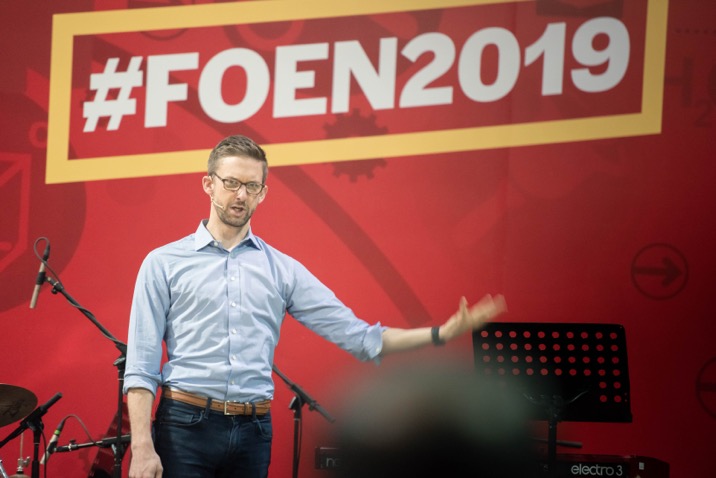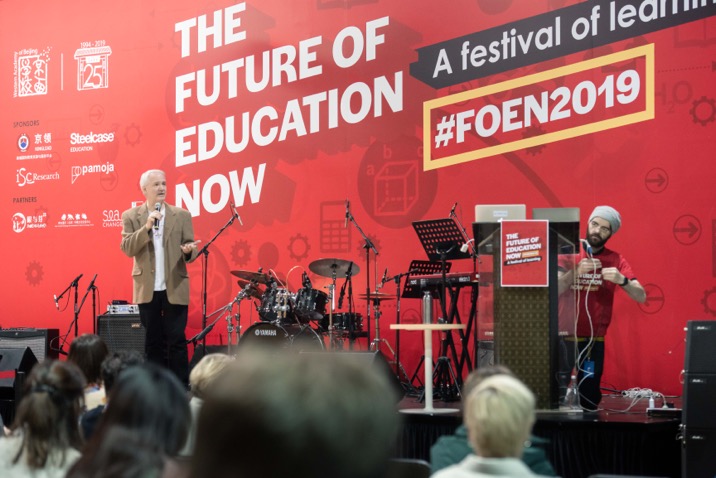Last week (Nov 13-16) educators, students, parents, and staff from across Beijing’s international school community and beyond gathered at Western Academy of Beijing’s (WAB) campus for a wide-ranging conference entitled Future of Education Now: A Festival of Learning (FOEN2019). The totality of the event was an ambitious investigation into current trends, the problems facing educators and students, as well as the progressive solutions being put forth to tackle these issues, and better prepare the learners of today for the uncertainty and consistently shifting landscape of tomorrow.
Beijingkids attended the final day of the conference, and here’s a quick recap of what we took away.
The festivities opened with an inspiring keynote address from author and Director of Impact at Silicon Valley’s Singularity University, Brett Schilke, who leads partnerships and program development for K-12 education. Schilke’s address served to contextualize the overarching themes of the conference, and shed light on the idea that “We can’t prepare our kids for a future they will not find.”

Ultimately, Schilke advocated for the notion that we should no longer be asking young people what they want to be when they grow up, but rather, what they want to enable in the world. He illustrated his point by breaking down the example of a child who expresses interest in becoming a doctor. According to Schilke, the medical industry, from physicians to pharmacists, is one of the most at-risk sectors for disruption and automation, and the skills a student may learn about medicine today very well could be obsolete by the time they finish college. Thus, Schilke advises that the student reframe their ambitions from, “I want to be a doctor,” to, “I want to help people,” thus offering them a wider scope through which to consider their career choice.
Moreover, given the fact that the current body of human knowledge doubles every 13 months, and will accelerate to an unprecedented doubling every 12 hours by the end of the 21st century, coupled with an amount of progress within the same timeframe to rival the last 20,000 years of history, Schilke thinks we should be focusing on “forecasting”, or trend-spotting. That is, students should be asking themselves how tech will change the industry they want to go into, and seriously consider such new realities as computer thinking, and the social and ethical implications of technological developments.
As Schilke so succinctly put it, “We teach history, why not teach the future?”
Another stellar presentation came from hometown hero John D’Arcy, WAB’s Deputy Director, who introduced the FLoW21 initiative, or Future of Learning at WAB. A couple years ago, D’Arcy and his team realized it was due time to restructure some of the policies, curriculums, and approaches to learning at WAB, and thus they began conversations around these topics. What made the process unique however was the fact that these discussions didn’t take place behind administrators’ closed doors, but involved every stakeholder, including the students themselves.

One particularly fascinating change that resulted from FLoW21 was the Day 9 Program, which allows students to build their own schedules on every ninth day of instruction. According to D’Arcy, this program makes space for students to “own” their time, and focus some of their efforts on those subjects that they are truly passionate about, or seek out further instruction for classes they may be struggling with. All in all, Day 9 tells the students, in no uncertain terms, that their success is ultimately in their own hands, and that, with this amount of freedom, the faculty at WAB trusts them to make good decisions.
While student agency and decision making was front-and-center throughout the conference, it really came to the fore during FOEN2019’s closing address, which was in fact presented by a collection of students who had attended the conference on behalf of various schools.
Over the course of the four days, they worked together to come up with the following mission statement:
“In order to be supportive, personalized and academically successful, a school should be student-centered, feature numerous approaches to learning, and offer a curriculum with real-world connections along with mentor support.”
They devised strategies that would be easy to implement, yet could have significant impacts on student prosperity, such as weekly well-being sessions, weekly student-teacher lunches, and the inclusion of students in more decision-making processes.
Simply put, it was a poignant end to a poignant week, and here at beijingkids, we are very excited about the future of education now!




